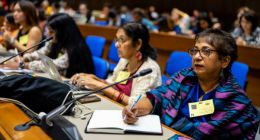The Women Who Shaped the Indian Constitution: Unsung Architects of Equality
28 NOV 2024
On Constitution Day (November 26), President Droupadi Murmu highlighted the significant contributions of women members in the Constituent Assembly, the body responsible for drafting the Constitution of independent India. They came from different backgrounds and brought unique ideas to the table, especially on topics like gender equality, caste, and reservations. Let’s take a look at the amazing contributions of these women
1732785209.jpg)
15 Women of the Indian Constituent Assembly (Picture credit: InsightsIAS)
1. Sarojini Naidu (1879–1949)
Known as the Nightingale of India, Sarojini Naidu was a poet, freedom fighter, and politician. She was the first woman to become the President of the Indian National Congress and later the first female governor of Uttar Pradesh. In the Assembly, she strongly supported civil rights, women’s equality, and the removal of untouchability.
2. Sucheta Kripalani (1908–1974)
Sucheta Kripalani was a freedom fighter who became India’s first woman Chief Minister (Uttar Pradesh). In the Constituent Assembly, she focused on labor rights and gender issues and was involved in drafting the Preamble of the Constitution.
3. Vijaya Lakshmi Pandit (1900–1990)
The sister of Jawaharlal Nehru, Vijaya Lakshmi Pandit was an experienced diplomat and the first woman to be the President of the United Nations General Assembly. She brought her diplomatic experience to the Assembly’s discussions on India's future foreign policies.
4. Dakshayani Velayudhan (1912–1978)
From the Pulaya community in Kerala, Dakshayani Velayudhan was the first Dalit woman to graduate in science in India. In the Assembly, she worked with Dr. B.R. Ambedkar on caste-related issues but opposed separate electorates, believing in a united India.
5. Ammu Swaminathan (1894–1978)
Ammu Swaminathan, a social reformer from Kerala, spoke strongly about women’s rights. She actively supported the Hindu Code Bill, which aimed to give women equal rights in marriage and property.
6. Renuka Ray (1904–1997)
Renuka Ray studied at the London School of Economics and later worked for women’s rights in India. In the Assembly, she fought for gender equality, especially in inheritance and property laws.
7. Annie Mascarene (1902–1963)
Annie Mascarene came from a marginalized Latin Christian community in Kerala but broke barriers to become one of the first female MPs in independent India. She pushed for universal voting rights and the importance of local governance.

1732784788.jpg)
8. Begum Qudsia Aizaz Rasul (1909–2001)
The only Muslim woman in the Assembly, Qudsia Aizaz Rasul initially represented the Muslim League but later joined the Congress. She opposed separate electorates based on religion and focused on national unity.
9. Hansa Jivraj Mehta (1897–1995)
A writer and reformer, Hansa Mehta represented India at the United Nations, where she worked to make the Universal Declaration of Human Rights more gender-inclusive. In the Assembly, she advocated for women’s education and equality.
10. Rajkumari Amrit Kaur (1889–1964)
Rajkumari Amrit Kaur was India’s first Health Minister. In the Assembly, she pushed for public health reforms and gender equality and worked on laws to improve women’s welfare.
11. Durgabai Deshmukh (1909–1981)
Durgabai Deshmukh was a social worker and activist who founded several organizations for women. In the Assembly, she focused on education and legal aid for underprivileged women.
12. Malati Choudhury (1904–1998)
Malati Choudhury from Odisha worked closely with Gandhi and fought for rural development and education. She brought attention to the need for equal distribution of resources.
13. Purnima Banerji (1911–1983)
Purnima Banerji was committed to civil liberties and worked to ensure that the Constitution protected everyone’s individual rights. She was a strong advocate for secularism and inclusion.
14. Leela Roy (1900–1970)
Leela Roy, a revolutionary freedom fighter, fought for women’s education and social reforms. In the Assembly, she focused on creating a society where women had equal opportunities.
15. Dr. Kamala Chowdhry
Kamala Chaudhary was a prominent freedom fighter and one of the 15 women members of the Constituent Assembly of India. A member of the Indian National Congress, she played an active role in advocating for women's rights and social reforms during the drafting of the Constitution. She was also known for her efforts in improving rural development and community welfare.
These 15 women played a huge role in shaping India’s future. From fighting for voting rights to promoting equality, their efforts ensured the Constitution reflected the dreams of all Indians. Their work reminds us that equality and justice are values we must continue to fight for even today.

1731409249.jpg)
1732094585.jpg)


















